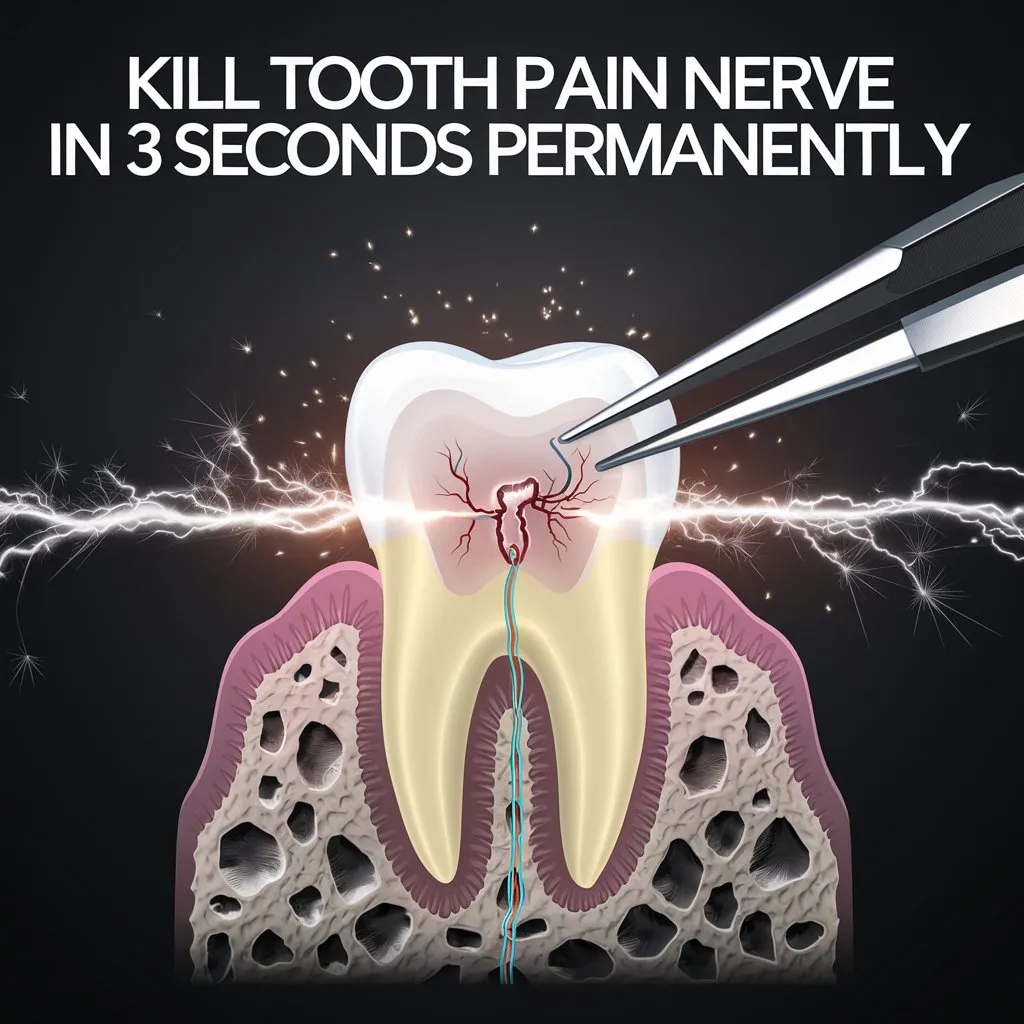Tooth pain can be one of the most unbearable experiences, and it's no wonder that people search for quick, permanent fixes to alleviate it. You might come across claims like "kill tooth pain nerve in 3 seconds permanently," but are these promises really achievable? In this article, we’ll break down the myths surrounding instant tooth pain relief and discuss real, effective solutions to manage and treat tooth nerve pain.
Can You Really Kill Tooth Pain Nerve in 3 Seconds Permanently?
The idea of killing tooth pain nerve in a matter of seconds sounds appealing—after all, no one wants to endure prolonged discomfort. However, quick fixes are often too good to be true. Tooth pain, especially nerve pain, typically requires more than a few seconds to address. While some home remedies can provide temporary relief, lasting solutions come from understanding the cause of the pain and seeking professional treatment.

What Causes Tooth Pain?
Tooth pain can originate from a variety of sources, but one of the most common causes is issues related to the tooth's nerve. Understanding the root of your discomfort is the first step toward finding an effective solution.
Common Causes of Tooth Pain
Tooth pain can be triggered by:
- Cavities: Tooth decay that reaches the inner layers of the tooth can expose the nerve, causing sharp, persistent pain.
- Gum Disease: Inflammation of the gums can spread to the bone and surrounding tissues, leading to tooth sensitivity and pain.
- Cracked or Damaged Teeth: Physical damage to a tooth can expose the nerve, causing intense discomfort.
- Infection or Abscess: An infected tooth can cause throbbing pain as the infection reaches the nerve.
Tooth Nerve Pain Explained
Tooth nerve pain occurs when the nerve inside the tooth becomes irritated or damaged. This pain can feel sharp, throbbing, or continuous. The nerve, located in the pulp, is highly sensitive, so any disruption—such as decay, infection, or trauma—can result in significant discomfort.
Why Quick Fixes Are Dangerous
Searching for an immediate solution to nerve pain is understandable, but it’s crucial to be cautious of claims that promise instant, permanent relief. Many DIY remedies can cause more harm than good.
The Truth Behind "Kill Tooth Pain Nerve in 3 Seconds Permanently"
Despite the enticing title, there is no scientifically proven method to "kill" tooth nerve pain in 3 seconds permanently without professional intervention. While some home remedies may provide temporary relief, they do not address the underlying problem. Long-term pain relief often requires treatment from a dentist, whether it’s through a root canal or other dental procedures.
Potential Risks of DIY Tooth Pain Remedies
Many people turn to DIY methods, but these can cause damage if not done correctly. For example:
- Applying too much clove oil can burn the surrounding gums.
- Using harsh substances may temporarily numb the pain but could damage the tooth enamel or the gum tissue.
Temporary Relief Methods for Tooth Nerve Pain
If you’re in pain and need temporary relief before seeing a dentist, there are a few safe methods you can try at home.
Over-the-Counter Pain Relievers
Medications like ibuprofen or acetaminophen can help reduce tooth nerve pain. These pain relievers work by reducing inflammation and blocking pain signals to the brain. While they won’t cure the issue, they can provide temporary comfort.
Cold Compress and Saltwater Rinse
A cold compress applied to the outside of your cheek can reduce swelling and numb the area, providing temporary relief. Additionally, rinsing your mouth with salt water can help reduce bacteria and alleviate inflammation.
Clove Oil and Other Home Remedies
Clove oil is a natural remedy that contains eugenol, a compound known for its numbing properties. Applying a small amount of clove oil to the affected area may provide short-term relief from nerve pain. However, this is not a permanent fix, and excessive use can irritate the surrounding gums.

Professional Dental Solutions to Tooth Nerve Pain
For long-lasting relief from tooth nerve pain, it’s essential to seek professional dental care. A dentist can accurately diagnose the cause of the pain and recommend appropriate treatment options.
Root Canal Therapy: Permanent Relief for Nerve Pain
A root canal is a common and effective treatment for severe tooth nerve pain. During this procedure, the dentist removes the damaged or infected nerve tissue, cleans the tooth’s interior, and seals it to prevent further infection. This eliminates the pain permanently while preserving the tooth.
Tooth Extraction: When Is It Necessary?
In cases where a tooth is too damaged or infected to be saved, extraction may be the only option. While this permanently removes the source of pain, it also leaves a gap that can affect your bite and oral health. Dental implants or bridges are often recommended to replace the extracted tooth.
Dental Fillings and Crowns
If tooth decay is causing nerve pain, a filling or crown may be used to restore the tooth’s structure and prevent further damage. Crowns, in particular, are used for teeth that have undergone root canal therapy or have significant structural damage.
How to Prevent Tooth Nerve Pain in the Future
The best way to avoid tooth nerve pain is through preventive care. By taking good care of your teeth and gums, you can reduce the risk of cavities, infection, and nerve damage.
Proper Oral Hygiene Practices
Brush your teeth at least twice a day with fluoride toothpaste, and don’t forget to floss daily. These simple habits help prevent the buildup of plaque, which can lead to tooth decay and gum disease.
Regular Dental Checkups
Seeing your dentist for regular cleanings and checkups allows them to catch any potential issues early. This helps prevent minor problems from escalating into more serious, painful conditions.
Diet and Lifestyle Tips to Keep Teeth Healthy
Limiting sugary foods and beverages can reduce your risk of cavities. Additionally, drinking plenty of water and maintaining a balanced diet rich in calcium and other essential nutrients supports overall dental health.

The Role of Dental Technology in Managing Tooth Nerve Pain
Advances in dental technology have made it easier than ever to diagnose and treat tooth nerve pain effectively.
Laser Dentistry for Tooth Pain
Laser technology is increasingly being used to treat tooth pain and gum disease. Lasers can be used to remove infected tissue and stimulate healing, offering a less invasive option compared to traditional treatments.
Digital X-Rays and Advanced Diagnostics
Modern dental offices often use digital X-rays and 3D imaging to get a more detailed view of your teeth and gums. This allows dentists to diagnose problems more accurately and plan treatments that effectively target the cause of nerve pain.
While the promise of killing tooth nerve pain in seconds sounds tempting, real relief comes from addressing the underlying cause of the problem. Quick fixes may provide temporary comfort, but professional dental care is necessary for lasting solutions. Whether through a root canal, filling, or extraction, a dentist can help eliminate tooth nerve pain for good.

 Vietnamese
Vietnamese









Nguyen Hoai Thanh
Nguyen Hoai Thanh is the Founder and CEO of Metaconex. With 12 years of experience in developing websites, applications and digital media, Nguyen Hoai Thanh has many stories and experiences of success to share.